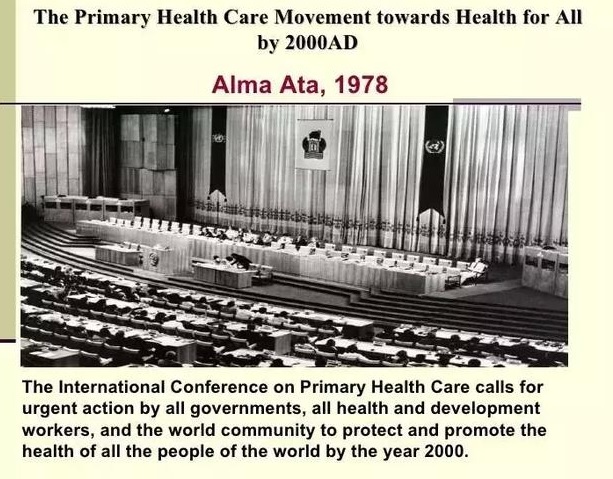Summary: From primary health care to universal coverage – the "affordable dream"
- Pioneer, Editorial Board

- Sep 5, 2019
- 3 min read
Updated: Sep 13, 2019
Image from: World Health Organization (Chinese version), Public Health Decade (2007-2017) publication
From the past 1978 to 2019, it has been more than 40 years. The developed, developed, and developing countries around the world have always advocated supporting primary health care. There are certain difficulties in implementing countries, such as: lack of medical professionals, The plan cannot be sustained, or the service is fragmented and so on.
The original content from the sourced articles:
"The Alma Ata Declaration of 1978 states that primary health care is the way to achieve health care for all by the year 2000."
To commemorate the 30th anniversary of the Almaty Declaration, the 2008 World Health Report entitled “Primary Health Care: The Past is Important, Now More Important” was released. The report carefully assesses the ways in which rich and poor countries organize, finance and deliver health care, and finds alarming inequalities in access to health care, health outcomes and the costs paid. Dr. Margaret Chan, Director-General of WHO, stated: “In the report, revitalizing primary health care is the best way to get the health system back on track and the most affordable way.”
The 2008 report of the Commission on Social Determinants of Health raised another set of arguments that strengthened the momentum for change. The Committee is deeply concerned about the increasing inequalities around the world and finds that there is sufficient evidence that the real upstream drivers of ill health exist in the social environment, such as low income, low education, limited employment options, and poor living and working conditions.
The information reported is optimistic: the social environment is shaped by policies and is therefore subject to change. In short, the distribution of different health conditions within the population reflects the fairness of the way economic and social policies are formulated. In the traditional field of prevention, public health will be greatly beneficial if the narrow biomedical approach to health promotion is expanded to include the root causes of unhealthy conditions that exist in the non-health sector. This is a new idea that sees health as the result of social determinants, not just the results of biomedical interventions.
The Commission advocates the promotion of primary health care and believes that this health system model can act on deep social determinants of health issues. It emphasizes the need to extend prevention to the non-health sector, which is welcomed in an era of growing concerns about the rise of chronic noncommunicable diseases.
The structural quality of the general medical organization, including human resources, fundraising and investment, basic hardware construction, information system support, business management level, etc. The core issue is to have a competent, prepared and proactive service spirit. A team of general professionals capable of sustainable development. As mentioned in the Astana Declaration: “We expect highly trained, skilled and enthusiastic and responsible health professionals to provide quality and safety to all in a compassionate, respectful and respectful manner. Comprehensive, integrated, accessible, affordable and affordable primary health care and health services."
Dr. Margaret Chan, WHO Director-General, once said: “National health coverage is the single most powerful concept that public health can come up with.”
Editorial group comment:
The concept of primary care (also known as primary health care) is still weak in Hong Kong. For example, there are no cases for referrals from social welfare organizations, and patients at the grassroots level have more limited resources. Even with the help of primary care doctors, there is still a lack of surrounding professional areas of Medical services, such as medical laboratory services, providing accurate medical information. In this point of view, our company, Pioneer MedLab Healthcare Services Limited, would like to go inside the communities, through health check, to spread medical information and to popularize the public for the concept of "prevention is better than cure", improve sub-health life, and reduce chronic diseases rely much more on the public health care system.
Source:
World Health Organization (Chinese version), Public Health Decade (2007-2017) publication
From the Almaty Declaration to the Astana Declaration: The development of general medicine is the top priority for achieving universal health coverage.
Https://kknews.cc/health/nrj5z5q.html
Almaty Declaration (1978, Chinese version)
Https://apps.who.int/iris/bitstream/handle/10665/39228/9245541355.pdf?sequence=3
World Health Report 2008: Primary health care: the past is important, now more important (Chinese version)
Https://www.un.org/chinese/esa/health/whoreport08/press_release.html





![[WHO] From vision to results: advancing health for billions in the South-East Asia Region](https://static.wixstatic.com/media/43ace5_3d6c754d5a7c4314ac6444464d3fad5c~mv2.jpg/v1/fill/w_502,h_723,al_c,q_85,enc_avif,quality_auto/43ace5_3d6c754d5a7c4314ac6444464d3fad5c~mv2.jpg)
Comments